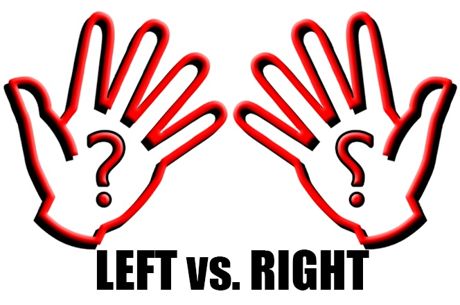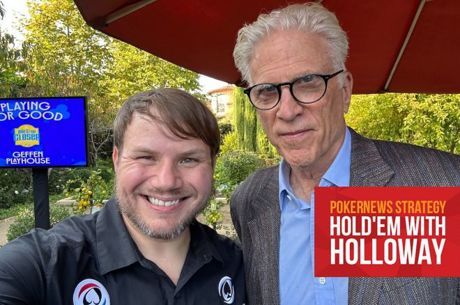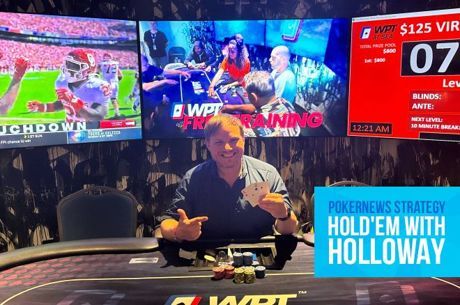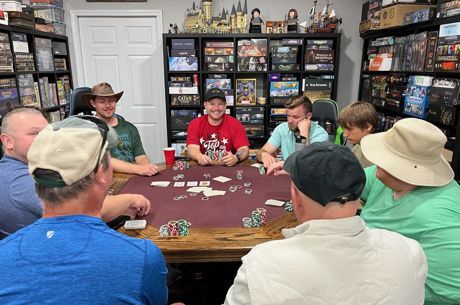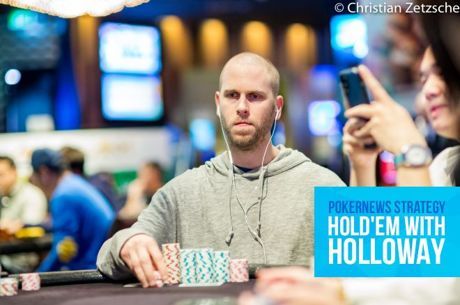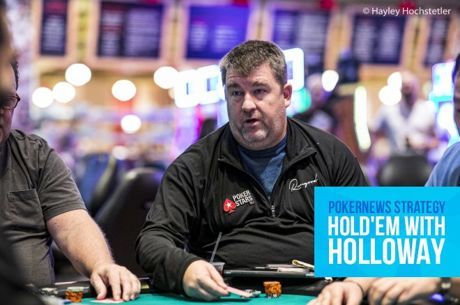Hold’em with Holloway, Vol. 70: In Order to Live You Have to Be Willing to Die

The late Amir Vahedi once memorably stated at the 2003 World Series of Poker, “In order to live, you must be willing to die.” What Vahedi was really saying was that in order to succeed in tournament poker, you must be willing to play as opposed to letting the fear of elimination paralyze you.
In a recent tournament, the $300 Knockout Bounty at Ho-Chunk Gaming Wisconsin Dells — a tournament that attracted 144 entries and awarded $9,331.50 to first — both Michael Miller and I experienced this truth, though in different ways.
“At Ho-Chunk I shot myself in the foot again,” Miller informed me after his elimination, which occurred in Level 10 (800/1,600/200) with approximately 45 players left in the field.
After a player had limped, Miller did the same with the Q♥10♥ from the button. Interestingly, queen-ten is known as the “Ho-Chunk Nuts” where I’m from.
“I thought I could take the pot down with a good flop, or with a low flop I could represent trips,” Miller explained. However, the player in the small blind proceeded to raise to 5,500, the big blind folded, and the limper called. Miller opted to do the same and the pot swelled to 19,100.
All three players checked an Ax8x5x flop, and the dealer burned and turned a Qx. The small blind led out for 7,000, the limper just called, and Miller ended up folding.
“I was thinking someone had a middle ace or maybe a KxQx and I was out-kicked, so I thought for awhile and folded instead of going all in,” said Miller. “I only had around 30,000 left and I don’t know why I couldn’t pull the trigger. As it turned out the river was another Qx and the small blind won the pot with JxJx.” A couple of hands later Miller shoved all in from the cutoff with the A♠9♠ and ran into the small blind’s AxKx to bust the tournament.
In the earlier hand, Miller was certainly put in a tough spot on the turn. In my opinion, moving all in is hard to do after a bet and call, though it does fall in line with the attitude that if you want to live you have to be willing to die.
Instead, I would have liked to see Miller bet after action checked to him on the flop. Both his opponents appeared to fear the ace, so it would have been a good opportunity for Miller to represent one with a bet, perhaps for 8,000. Had he done so and received a call, he would pair his queen on the turn where action would likely have gone check-check, and he’d trip up on the river. Of course that’s being results-oriented, but I think a flop bet would have been worthwhile in that instance.
As Miller pointed out by his “shot myself in the foot again” statement, that wasn’t his first time failing to execute. Two weeks earlier at Choctaw Casino he was in a tournament with 20 of 87 players remaining when he raised to 5,000 with QxQx. The button called for about a third of his stack, the flop came down Ax9x4x, and Miller checked. The player on the button then moved all in and Miller folded.
“What was I thinking?” Miller asked. “I should have continuation bet because I could have taken it down right then, or it would have made it easier to call his all-in if he shoved. He showed a suited QxJx for the bluff. Yes, I didn’t want to die, so that also means I also didn’t want to live. He went on a heater and happened to take me out a level-and-a-half later.”
It’s never fun to look down at a big pocket pair, get a caller, and then have an ace hit the flop. It’s too easy to convince yourself your opponent flopped an ace. However, what a lot of players seem to forget is by showing strength preflop you’re the one representing a big hand. Pocket queens falls into that category, but so do big aces, which you’re much more likely to have. By continuing on the flop, Miller would have stuck to his story that he had a big hand instead of one he was willing to give up on. The pressure would have been on his opponent instead of the other way around.
Poker pros continuation bet because they know their opponents are more likely to miss a flop than hit it. By betting, they test the waters to find out exactly where they stand. Most of the time they’re going to win the pot — like Miller would have done had he continuation bet — and in the instances they meet resistance, it’s an easy fold.
Of course the willingness to die in order to live doesn’t always play out that way. Sometimes your willingness to die will in fact lead to your death. Case in point, my experience in the same tournament.
After being the very first player eliminated — I was a little too willing to die, I guess — I reentered and promptly built up a big stack. Midway through I was sitting on 160,000, which was four times the average. By the time we were down to 24 players, I was still sitting pretty, though several players had closed the gap.
That is when the second-biggest stack at the table, an elderly gentleman with 125,000 in early position, opened for 11,500 at the 2,000/4,000/500 level. Action folded to me in the big blind and I looked down at 10♦10♠. I could have three-bet, but instead decided to call with the intention of ditching my hand if the flop contained big cards. As it happened, the J♠4♣2♣ flop only contained one.
I checked, my opponent bet 18,500, and I hit the tank. My first impression was that I didn’t want to play a big pot against the second-biggest stack at my table. I could simply fold, preserve my remaining 145,000, and likely coast my way into the money. However, I couldn’t shake the feeling that my tens were good here a lot of the time.
My opponent could hold a slew of hands I had beat including AxKx, AxQx, and pocket pairs smaller than mine. He’d surely continuation bet all of them. Finally I decided folding my hand would be a bad move — I was willing to die in order to live. Unfortunately, I made a blunder by moving all in. (I should have just check-raised to 45,000 or so and found out where I stood.)
My opponent snap-called off his stack of 115,000 and showed A♣J♣ for top pair with a flush draw. I was in a bad way, and paid the price when both the turn and river blanked. I was eliminated a short time later in 20th place for $0.
Being willing to die in order to live is a powerful thing, and something I respect in poker. However, it doesn’t always have to be one or the other, something well illustrated by the hands discussed above. Had Miller either bet the flop in his first hand or continuation bet in the second, he likely would have won without putting his tournament life on the line. Likewise, had I simply check-raised a reasonable amount instead of shoving, I would have preserved a ton of chips and lived to fight another day.
Be willing to die in order to live, but don’t make all situations that simple. Oftentimes there are other options that’ll help extend your tournament life.
Want to stay atop all the latest in the poker world? If so, make sure to get PokerNews updates on your social media outlets. on Twitter and find us on both and !
In this Series
- 1 Hold’em with Holloway, Vol. 1: Making Reads and Trusting Them
- 2 Hold’em with Holloway, Vol. 2: Playing in Poker Charity Events
- 3 Hold’em with Holloway, Vol. 3: Throttle Back Before You End Up Punting
- 4 Hold’em with Holloway, Vol. 4: Punish the Satellite Bubble
- 5 Hold’em with Holloway, Vol. 5: What is Proper Accumulator Strategy?
- 6 Hold’em with Holloway, Vol. 6: A Chip and a Chair Story with “SirWatts”
- 7 Hold’em with Holloway, Vol. 7: 15 Things About Poker I Wish I’d Known Sooner
- 8 Hold’em with Holloway, Vol. 8: Examining the Largest Overlay in Poker History
- 9 Hold’em with Holloway, Vol. 9: Differences Between Rebuys and Reentries
- 10 Hold’em with Holloway, Vol. 10: Five Must-Read Poker Books of 2014
- 11 Hold’em with Holloway, Vol. 11: When Will You Finally Break Through?
- 12 Hold’em with Holloway, Vol. 12: Dealing with a Target on Your Back
- 13 Hold’em with Holloway, Vol. 13: Knowing When to Call It Quits
- 14 Hold’em with Holloway, Vol. 14: Embarking on a Year-Long Weight Loss Journey
- 15 Hold’em with Holloway, Vol. 15: Navigating Multiple Decision Points in a Poker Hand
- 16 Hold’em with Holloway, Vol. 16: Chris Moorman Tells Me How Badly I Play Poker
- 17 Hold’em with Holloway, Vol. 17: Richard “nutsinho” Lyndaker on Getting It in Marginal
- 18 Hold’em with Holloway, Vol. 18: Getting Inside the Head of Poker Pro Brian Rast
- 19 Hold’em with Holloway, Vol. 19: Stupid Calls & Lucky Draws in MSPT WI Championship
- 20 Hold’em with Holloway, Vol. 20: Talking Ante-Only Strategy with Greg “FossilMan” Raymer
- 21 Hold’em with Holloway, Vol. 21: Contributing to Jonathan Little’s New Book
- 22 Hold’em with Holloway, Vol. 22: Consequences of Acting Out of Turn & Tossing in Chips
- 23 Hold’em with Holloway, Vol. 23: When It Comes to Chops, Do What’s In Your Best Interest
- 24 Hold’em with Holloway, Vol. 24: Accepting Bad Beats & Lessons in Selling Action
- 25 Hold’em with Holloway, Vol. 25: Heinz’ Ace-High Call Shows Why He's a World Champ
- 26 Hold’em with Holloway, Vol. 26: Is Keeping the Short Stack Alive Collusion?
- 27 Hold’em with Holloway, Vol. 27: Great Laydown or Bad Fold on Poker Night in America?
- 28 Hold’em with Holloway, Vol. 28: Calling Hellmuth with Jack-Deuce Offsuit
- 29 Hold’em with Holloway, Vol. 29: The Philosophy of "No-Chop" Chad
- 30 Hold’em with Holloway, Vol. 30: Preparing to Play the World Series of Poker
- 31 Hold’em with Holloway, Vol. 31: Staying on Your Grind at the World Series of Poker
- 32 Hold’em with Holloway, Vol. 32: The Perilous Decision to Call Off with Ace-Queen
- 33 Hold’em with Holloway, Vol. 33: Using Poker Skills in Reality TV Competitions
- 34 Hold’em with Holloway, Vol. 34: Esfandiari Explains How to Recover from Bad Beats
- 35 Hold’em with Holloway, Vol. 35: Tilly vs. Brunson in Super High Roller Cash Game Hand
- 36 Hold’em with Holloway, Vol 36: Unconventional Play Leads to Good WSOP Main Event Start
- 37 Hold’em with Holloway, Vol. 37: Lessons in Pot-Limit Omaha Hi-Low w/ Evan Jarvis
- 38 Hold’em with Holloway, Vol. 38: Things to Say and Do When You Bust a Poker Tournament
- 39 Hold’em with Holloway, Vol. 39: How Much Did I Have to Raise to Get You to Fold?
- 40 Hold’em with Holloway, Vol. 40: Practicing Patience in My Deep PPC Poker Tour Run
- 41 Hold’em with Holloway, Vol. 41: Analyzing a Questionable SHRPO Main Event Hand
- 42 Hold’em with Holloway, Vol. 42: Analyzing the Play of Neymar Jr. at EPT Barcelona
- 43 Hold’em with Holloway, Vol. 43: The Value of a Reliable Poker Reputation
- 44 Hold’em with Holloway, Vol. 44: John “KasinoKrime” Beauprez Rips My PLO Game Apart
- 45 Hold’em with Holloway, Vol. 45: Satellite Dilemmas -- To Call or Not to Call
- 46 Hold’em with Holloway, Vol. 46: Seiver Leverages the River in Super High Roller Bowl
- 47 Hold’em with Holloway, Vol. 47: What Untraditional Moves in Poker Might Mean
- 48 Hold’em with Holloway, Vol. 48: Thinking About the Future with Sam Grizzle
- 49 Hold’em with Holloway, Vol. 49: WCOOP Champ “Coenaldinho7” Offers Up His Biggest Hands
- 50 Hold’em with Holloway, Vol. 50: The Peril of Shoving Weak Aces
- 51 Hold’em with Holloway, Vol. 51: The Importance of Not Giving Up in Poker Tournaments
- 52 Hold’em with Holloway, Vol. 52: Does Asking “Check” Actually Constitute a Check?
- 53 Hold’em with Holloway, Vol. 53: Thomas Cannuli Impresses Even After Main Event Bustout
- 54 Hold’em with Holloway, Vol. 54: Dealers Aren’t Always Right
- 55 Hold’em with Holloway, Vol. 55: Don’t Get Married to Pocket Aces
- 56 Hold’em with Holloway, Vol. 56: Bazeley’s Survival Instinct Leads to Continued Success
- 57 Hold’em with Holloway, Vol. 57: Playing “Deuces Wild” on the European Poker Tour
- 58 Hold’em with Holloway, Vol. 58: The Wildest Hand in European Poker Tour History
- 59 Hold’em with Holloway, Vol. 59: Death, Zombies & Spending Time w/Phil Hellmuth
- 60 Hold’em with Holloway, Vol. 60: How the Unstoppable Fedor Holz Managed to Win Again
- 61 Hold’em with Holloway, Vol. 61: Lessons To Be Learned When You Hit the Big Stage
- 62 Hold’em with Holloway, Vol. 62: Steve O’Dwyer Explains the “Oreo Cookie Tell”
- 63 Hold’em with Holloway, Vol. 63: What Would Happen to a Chip Stack If a November Niner Died?
- 64 Hold’em with Holloway, Vol. 64: Forgetting One Chip -- Should It Still Be an All-In Bet?
- 65 Hold’em with Holloway, Vol. 65: Todd “sharkslayerrr” Breyfogle on Bankroll Management
- 66 Hold’em with Holloway, Vol. 66: Cash Game Pro Daniel Arfin Offers Sound Bankroll Advice
- 67 Hold’em with Holloway, Vol. 67: Honeyman Plays Kings to Keep in Opponent’s Bluff Range
- 68 Hold’em with Holloway, Vol. 68: Why Do I Even Bother Drinking at the Poker Table?
- 69 Hold’em with Holloway, Vol. 69: Is Your Favorite Poker Pro Left- or Right-Handed?
- 70 Hold’em with Holloway, Vol. 70: In Order to Live You Have to Be Willing to Die
- 71 Hold’em with Holloway, Vol. 71: How to Amass a Big Stack Early in a Poker Tournament
- 72 Hold’em with Holloway, Vol. 72: Answering User-Submitted Poker Scenarios
- 73 Hold’em with Holloway, Vol. 73: Saying Goodbye with a Top Five List
- 74 Hold'em with Holloway, Vol. 74: We're Back, Baby!
- 75 Hold'em with Holloway, Vol. 75: Jivkov on Exploiting Capped Ranges
- 76 Hold’em with Holloway, Vol. 76: Matt Bretzfield Gets Tricky With Aces
- 77 Hold'em with Holloway, Vol. 77: Joseph Cheong Gets Crazy with a Pair of Ladies
- 78 Hold'em with Holloway, Vol. 78: Wyoming Poker Action & Wild South Dakota Hand
- 79 Hold'em with Holloway, Vol. 79: Calling Controversy at WinStar
- 80 Hold'em with Holloway, Vol. 80: Going for Value with Matt Hunt
- 81 Hold'em with Holloway, Vol. 81: Bracelet Winner Ryan Leng on Bad Call
- 82 Hold'em with Holloway, Vol. 82: Romeopro33 Recounts XL Eclipse Victory
- 83 Hold'em with Holloway, Vol. 83: Men The Master Doesn't Get Paid
- 84 Hold'em with Holloway, Vol. 84: Harman Hits Back-to-Back Miracle Turns
- 85 Hold'em with Holloway, Vol. 85: Jamie Kerstetter on Dealing with Bounties
- 86 Hold'em with Holloway, Vol. 86: Matt Stout Develops a Limp Dynamic
- 87 Hold'em with Holloway, Vol. 87: Matt Alexander Caught in Between w/ Two Red Aces
- 88 Hold'em with Holloway, Vol. 88: John Beauprez on Why He Folded a Set of Jacks
- 89 Hold'em with Holloway, Vol. 89: Alex Aqel Lets Opponent Hang Himself with Aces
- 90 Hold'em with Holloway, Vol. 90: David Peters Makes Beastly Call Against Will Givens
- 91 Hold'em with Holloway, Vol. 91: Poker Lessons from a Game of Risk
- 92 Hold'em with Holloway, Vol. 92: My Upstuck Diagnosis by the CLC Squad
- 93 Hold'em with Holloway, Vol. 93: Alex Foxen Coolers Nick Petrangelo in SHRB
- 94 Hold'em with Holloway, Vol. 94: My $25,000 PSPC Experience at 2019 PCA
- 95 Hold'em with Holloway, Vol. 95: The Equity of Leveraging Time Extensions
- 96 Hold'em with Holloway, Vol. 96: Dan O'Brien on Developing Healthy Routines
- 97 Hold'em with Holloway, Vol. 97: Big Hands From the WSOP-C Potawatomi
- 98 Hold'em with Holloway, Vol. 98: Simon Deadman Rips Apart My NLH Tourney Play
- 99 Hold'em with Holloway, Vol. 99: Shoving 10-6 Smack Dab Into Pocket Aces
- 100 Hold'em with Holloway, Vol. 100: The Revived Re-Entries Debate

